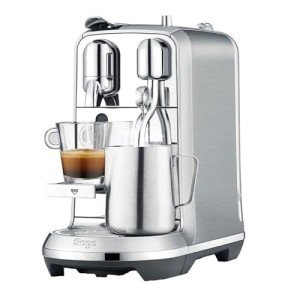Home Use Espresso Machines: A Comprehensive Guide
Espresso machines have actually become a staple in many households as coffee enthusiasts look for to reproduce café-quality brews in the comfort of their kitchen areas. The increase in appeal has actually caused a diverse market filled with numerous models, features, and rates. This post intends to offer a helpful overview of home use espresso machines, helping readers browse their options efficiently.
Understanding Espresso Machines
Espresso machines work by forcing hot water through finely-ground coffee under high pressure, leading to a focused coffee beverage called espresso. There are several types of espresso machines categorized based upon their developing approaches and level of automation. The most typical types consist of:
- Manual Espresso Machines: These require the user to control the pressure and water circulation, allowing for a more hands-on coffee-making experience.
- Semi-Automatic Espresso Machines: These offer automatic control over water pressure, while the user manually grinds and tamps the coffee.
- Automatic Espresso Machines: With the push of a button, these machines automatically control the flow of water, making it simpler to brew espresso with constant outcomes.
- Super-Automatic Espresso Machines: These all-in-one machines manage grinding, tampering, developing, and even milk frothing, making them perfect for users looking for benefit.
- Pill or Pod Machines: These use pre-packaged coffee pods to produce espresso with minimal effort, however they limit option in brewing methods and tastes.
Table: Comparison of Espresso Machine Types
| Type | Control Level | Relieve of Use | Cleaning Level | Ideal For |
|---|---|---|---|---|
| Manual | User-controlled | Moderate | High | Coffee purists |
| Semi-Automatic | Partial automation | Moderate | Moderate | Home baristas |
| Automatic | Totally automated | Easy | Low | Hectic people |
| Super-Automatic | Totally automated | Extremely simple | Extremely low | Convenience hunters |
| Capsule/Pod | Totally automated | Very easy | Really low | Casual drinkers |
Key Features to Consider
When selecting a home use espresso machine, it's necessary to think about different features that can substantially impact the quality of espresso and user experience.
- Pressure: Look for machines that supply a minimum of 9 bars of pressure, as this is considered optimum for developing espresso.
- Boiler Systems: Single vs. dual boiler systems identify temperature stability and the ability to brew espresso and steam milk at the same time.
- Grinder: Integrated grinders permit for newly ground coffee, which improves flavor. Think about machines with adjustable grind settings.
- Milk Frother: For those who enjoy coffees and lattes, an integrated steam wand or automatic frother is essential.
- Size and Design: Consider your kitchen area and aesthetic choices. Machines come in numerous sizes, from compact to large setups.
- Cost: Home espresso machines can range from a few hundred to numerous thousand dollars, so it's vital to develop a budget before exploring alternatives.
Advantages and disadvantages of Home Use Espresso Machines
| Pros | Cons |
|---|---|
| Convenience of brewing coffee in your home | Preliminary financial investment can be high |
| Quality of espresso is frequently remarkable | Needs some skill, specifically with manual machines |
| Ability to try out tastes | Maintenance and cleaning can be labor-intensive |
| Can save money in the long run | Not all machines will match every coffee preference |
Upkeep and Cleaning Tips
Keeping an espresso machine is important for extending its life and guaranteeing consistent brew quality. Here are some beneficial suggestions:
- Regular Descaling: Minerals from water can develop in the machine. Descale every 1-3 months, depending upon water hardness.
- Daily Cleaning: Rinse portafilters, baskets, and steam wands after each use to avoid coffee oils from constructing residue.
- Use Filtered Water: This can help in reducing mineral accumulation and enhance the taste of coffee.
- Change Gaskets and Seals: These parts may wear with time and needs to be replaced to maintain pressure and performance.
- Read the Manual: Each machine has specific care directions; following these will guarantee longevity.
FAQs About Home Use Espresso Machines
Q1: What is the very best budget espresso machine?The best budget espresso machine typically depends upon specific needs, but designs like the DeLonghi EC155 or the Breville Bambino are popular amongst users for offering great value. Q2: How long do home espresso machines generally last?With correct upkeep, home espresso machines can last anywhere from 5 to 15 years, depending upon the quality of the machine and frequency of use. Q3: Can I make coffees and lattes with any espresso machine?While most espresso machines can make cappuccinos and lattes, having a dependable
steam wand or frother is essential for accomplishing the ideal milk texture.
Q4: Are super-automatic machines worth the investment?For those who prioritize convenience and quick brewing, super-automatic machines can be worth the investment, though they may lack some customizability in brew strength and taste. Buy Espresso Coffee Machines : What kinds of coffee beans are best for espresso?While individual preference plays a function, beans identified as" espresso "blends are normally roasted darker, creating rich tastes and a velvety texture when brewed.
Purchasing a home espresso machine can change the daily coffee regimen into something special, raising home brews to café quality. By understanding the various kinds of machines, essential features to consider, upkeep needs, and weighing the
pros and cons, consumers can make educated choices that suit their individual preferences. As the espresso culture continues to grow, no matter the option, every brew can be a tasty experience waiting to be relished.

